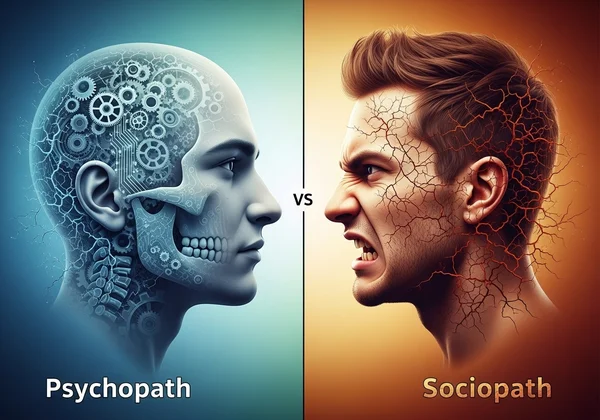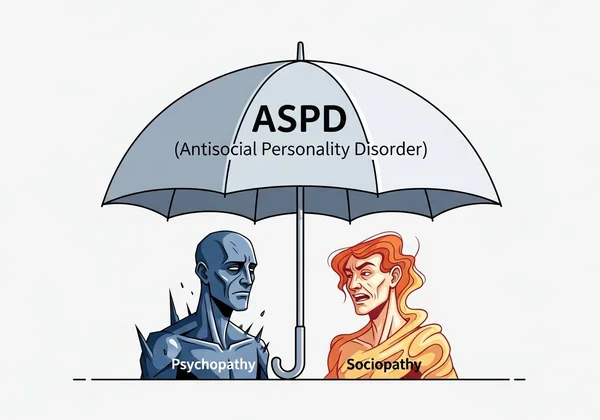Psychopathy Test Insights: Key Differences Between Psychopaths and Sociopaths Explained
The terms "psychopath" and "sociopath" are often used interchangeably in popular culture to describe individuals who are cold, calculating, and morally bankrupt. But in the field of psychology, these terms describe distinct patterns of behavior and personality. Understanding the psychopath vs sociopath distinction is crucial for anyone interested in personality psychology, navigating complex relationships, or simply seeking to understand human nature. So, what is the difference between a psychopath and a sociopath?
These labels, while not formal clinical diagnoses themselves, point to different underlying causes, emotional capacities, and behavioral tendencies. Understanding these nuances brings clarity, helping you look past sensationalized stereotypes. If you're exploring these concepts for self-understanding, it's important to approach the topic with curiosity and responsibility. You can explore your own traits through our educational, science-inspired tool.

Understanding Psychopathy: Core Traits and Manifestations
Psychopathy is often considered a more severe and innate condition. It is characterized by a profound lack of empathy and an inability to form genuine emotional bonds. Think of it as a fundamental difference in how someone is wired. They may learn to mimic emotions, but they don't feel them in the same way others do.
What Defines a Psychopath? Key Characteristics
The classic image of a psychopath is someone who is charming, intelligent, and highly manipulative. Their lack of remorse allows them to exploit others without guilt. Key characteristics often include:
- Superficial Charm: They can be witty and engaging, but it's a mask used to achieve their goals.
- Grandiose Sense of Self-Worth: A belief that they are superior to others and that rules don't apply to them.
- Pathological Lying: Lying is a primary tool for manipulation and control.
- Lack of Empathy or Remorse: An inability to understand or share the feelings of others, and no guilt for the harm they cause.
These traits are often studied using frameworks like the Hare Psychopathy Checklist-Revised (PCLR), a foundational tool from renowned researcher Dr. Robert Hare that informs many professional assessments, including the basis for a reliable test for psychopathy.
The Role of Planning and Control in Psychopathic Behavior
A defining feature of psychopathy is the calculated and meticulous nature of their actions. They are often highly organized and can maintain a facade of normalcy for years, holding down jobs and even having families. This manipulation is not impulsive; it is a long-term strategy. Their crimes, if they commit them, are often well-planned to minimize risk and maximize gain. This ability to detach emotionally allows them to be ruthlessly efficient in their pursuits.

Defining Sociopathy: Characteristics and Behavioral Patterns
While psychopathy is often seen as stemming from genetics ("nature"), sociopathy is more closely linked to environmental factors ("nurture"). It is believed to develop as a result of childhood trauma, abuse, or an unstable upbringing. Unlike psychopaths, individuals with sociopathic traits may be capable of forming some emotional attachments, though these bonds are often weak or distorted.
Common Traits of Sociopaths: Impulsivity and Erraticism
The hallmark of sociopathy is impulsivity. Their behavior is often erratic, volatile, and marked by sudden outbursts of anger or violence. They struggle to hold down a job or maintain stable relationships due to their unpredictable nature. Whereas a psychopath plans meticulously, a sociopath is more likely to act on a whim without considering the consequences. Their lives often appear chaotic and disorganized to outsiders.

Environmental Factors and Sociopathy's Development
The development of sociopathic traits is strongly tied to negative life experiences. A childhood lacking in positive role models and filled with instability can prevent a person from developing a strong moral compass or a sense of empathy for others. This difficult upbringing often results in a person who is constantly on edge and views the world as a hostile place, leading to reactive and antisocial behaviors. This helps answer the age-old question, "Are psychopaths born or made?" In the case of sociopathy, environmental factors play a significant role.

Psychopath vs. Sociopath: Dissecting the Key Differences
Now that we've outlined the two concepts, let's place them side-by-side to highlight their core distinctions. This comparison helps clarify why lumping them together can be misleading and unhelpful. For those looking to understand these complex personalities, recognizing these differences is the first step.
Origins & Development: Nature vs. Nurture's Influence
The most fundamental difference lies in their presumed origins.
- Psychopathy: Believed to be largely genetic or biological. Individuals with these traits are often described as being "born that way."
- Sociopathy: Believed to be a product of their environment. Trauma, neglect, and abuse are seen as primary contributors.
Behavioral Manifestations: Calculated vs. Impulsive Actions
Their behavior in the world is a direct reflection of their inner state.
- Psychopath: Methodical, controlled, and calculating. They are skilled manipulators who can maintain a stable outward appearance.
- Sociopath: Impulsive, erratic, and volatile. They are prone to emotional outbursts and live more chaotic lives.
Empathy and Conscience: The Core Distinctions
Their capacity for human connection is perhaps the most critical distinction.
- Psychopath: A complete inability to feel empathy or remorse. They do not form genuine emotional bonds.
- Sociopath: May have a limited capacity for empathy and can form attachments to specific individuals or groups, though these connections are often unstable.
Understanding where you or someone you know might fall on this spectrum of traits can be a complex journey. A free online psychopathy test can serve as a starting point for responsible self-reflection.
Psychopathy, Sociopathy, & ASPD: How They Relate to Psychopathy Assessments
To fully understand this topic, we need to introduce Antisocial Personality Disorder (ASPD). Unlike "psychopath" and "sociopath," ASPD is a formal clinical diagnosis found in the Diagnostic and Statistical Manual of Mental Disorders (DSM-5), published by the American Psychiatric Association.
Understanding ASPD: The Diagnostic Framework
ASPD is a mental health condition characterized by a long-term pattern of manipulating, exploiting, or violating the rights of others. Its diagnosis is based on observable behaviors, such as a disregard for social norms, deceitfulness, impulsivity, aggressiveness, and a lack of remorse. To be diagnosed, a person must be at least 18 years old and have shown symptoms of conduct disorder before age 15.
Overlap & Key Distinctions: Navigating the Terms
Psychopathy and sociopathy are best understood as constructs that fall under the umbrella of ASPD. Most individuals who would be labeled as psychopaths or sociopaths would meet the diagnostic criteria for ASPD. However, not everyone with ASPD would be considered a psychopath. Psychopathy, with its emphasis on a profound lack of empathy and calculated cruelty, is considered a more severe form of ASPD. Sociopathy aligns more with the impulsive and reactive behavioral criteria of ASPD.

Why Precision Matters: Moving Beyond Misconceptions
Understanding the differences between psychopathy, sociopathy, and ASPD is more than a semantic exercise. It allows for a more nuanced and responsible conversation about complex human behaviors. It helps us move away from cartoonish villains and toward a clearer understanding of personality and mental health. This clarity is essential for students, professionals, and anyone seeking to understand themselves or the people in their lives.
If this exploration has sparked your curiosity about your own personality traits, we invite you to take our free test. Our science-inspired assessment is designed as an educational tool to provide you with a confidential, preliminary look into your traits. For those seeking deeper understanding, we also offer an AI-powered personalized report that analyzes your strengths, challenges, and their impact on your daily life.
Frequently Asked Questions About Psychopathy vs. Sociopathy
What is the primary difference between a psychopath and a sociopath?
The primary difference lies in their origin and behavior. Psychopathy is thought to be largely innate (nature), characterized by a complete lack of empathy and calculated, controlled behavior. Sociopathy is believed to stem from environmental factors like trauma (nurture) and is characterized by impulsive, erratic, and volatile actions.
Are psychopathy and sociopathy clinical diagnoses?
No, they are not formal clinical diagnoses. They are psychological constructs used to describe specific sets of personality traits and behaviors. The official clinical diagnosis that encompasses many of these behaviors is Antisocial Personality Disorder (ASPD).
How does Antisocial Personality Disorder (ASPD) relate to psychopathy and sociopathy?
ASPD is the formal diagnosis, while psychopathy and sociopathy are informal labels for specific trait patterns. Most individuals identified as psychopaths or sociopaths would meet the criteria for ASPD. However, psychopathy is generally considered a more severe variant, distinguished by a profound lack of empathy that isn't a required criterion for an ASPD diagnosis.
Can I use an online psychopathy test to identify these traits in myself or others?
Online tests should be used for educational and self-exploration purposes only. They are not a substitute for a professional clinical evaluation and cannot provide a diagnosis. Tools like our educational tool are designed to offer preliminary insights and encourage responsible self-reflection in a confidential setting, not to label yourself or others. If you have serious concerns, please consult a qualified mental health professional.